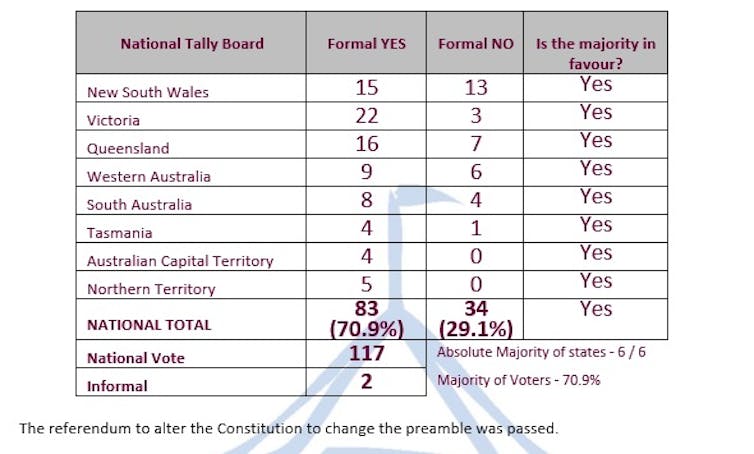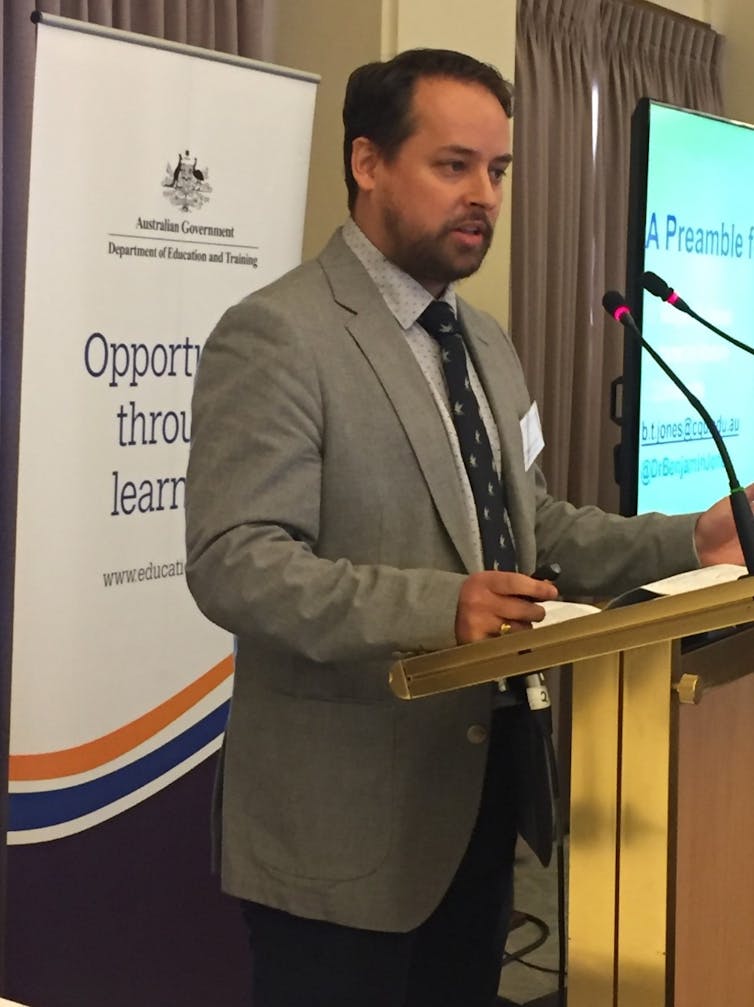Young Australians champion 'democracy' and 'freedom' in designing constitutional change
- Written by Benjamin T. Jones, Lecturer in History, CQUniversity Australia
When the Australian constitution was written in the 1890s, the authors did not envision an independent nation, but a self-governing dominion of the British empire. As such, the preamble does not contain flowery language about national values. Instead it is a dry, legalistic introduction simply noting that some of her majesty’s “possessions” have federated. One unsuccessful attempt to change it was made in a 1999 referendum.
In March 2019, 120 high school students from around Australia met in Canberra for the 24th National Schools Constitutional Convention. Their mission was to write a new preamble, with the authors of this article serving as facilitators. Over two days of lively debate, sometimes heated but always civil, a final version was drafted.
In a referendum-style vote, a majority of students and a majority from each state ratified the preamble (83 “yes”, 34 “no”, two voted informal, one abstained). The students’ preamble was presented to the federal Senate on April 2 and entered into Hansard.
 The referendum result.
The referendum result.
The students’ preamble
We the Australian people, united as an indissoluble Commonwealth, commit ourselves to the principles of equality, democracy and freedom for all and pledge to uphold the following values that define our nation.
We stand alongside the traditional custodians of the land and recognise the significance of Aboriginal and Torres Strait Islander cultures in shaping the Australian identity, their sovereignty was never ceded.
As a nation and indeed community, we are united under the common goal to create a society catered to all, regardless of heritage or identity.
We pledge to champion individual freedom and honour those who have served and continue to serve our nation.
As Australians, we stand for the pursuit of a democratic state that upholds the fundamental principles of human values as set out by this Constitution.
The student’s preamble differs enormously from the one written in the 19th century. It is noteworthy that it includes the words “democratic” and “freedom” twice – neither are in the current preamble or the constitution. From the students’ preamble, three elements emerge that young people want to see enshrined.
Acknowledging First Nations
During the debates, the most contested issue was whether to explicitly recognise First Nations people and if so, how. Ultimately, the students, including a representative group of Indigenous students, voted strongly in favour of constitutional recognition. In particular, the phrase “sovereignty was never ceded” is significant.
It is a rallying cry for many First Nations people and a rejection of assimilation. Indigenous Australians are still fighting for self-determination and the right to be heard. The Voice to Parliament put forward by the Uluru Statement is still being debated. Constitutional recognition that sovereignty was never ceded is a more radical proposal. It suggests that Indigenous justice is important to young Australians.
Egalitarianism is still key
The egalitarian ideal has a long history in Australia. The concept of the “fair go” is mythical in one sense, but a cherished part of the collective imagination.
The first line of the students’ preamble commits the nation to the principle of equality. The third line stresses the importance of a “society catered to all”.
Although not explicitly stated, the word “identity” suggests the LGBT community was in mind. Young Australians overwhelmingly supported the same-sex marriage plebiscite in 2017. The government is currently considering new religious freedom laws in response to the sacking of Israel Folau by Rugby Australia.
It is significant, then, that young Australians place such value on society being catered for all, “regardless of heritage or identity”.
Values matter
What permeates through the students’ preamble is the message that values matter. Unlike the original constitutional writers, young people want their preamble to be a mission statement that articulates the “values that uphold the nation”. The trident of “equality, democracy and freedom” are highlighted.
The preamble also notes the twin priorities of a free state that sit together though sometimes in tension. As the third line notes, Australia is a “nation and indeed community”. But the fourth line tempers this with a commitment to “champion individual freedom”. The ideal democratic state for these young Australians places value on both the individual and the collective.
 Dr Benjamin T Jones addresses the convention.
Dr Benjamin T Jones addresses the convention.
Time for change?
At the 1999 referendum, Prime Minister John Howard, despite being against a republic, campaigned in favour of a new preamble. The one he and republican Les Murray authored did not gain much popularity. But it is significant that even an ardent monarchist like Howard was convinced the preamble needed to be updated.
The authors of the students’ preamble were mainly in Year 11 and too young to vote in the May election. Nevertheless, they are thoughtful, intelligent citizens and the future of our democracy. Their voice is worth listening to.
Authors: Benjamin T. Jones, Lecturer in History, CQUniversity Australia





